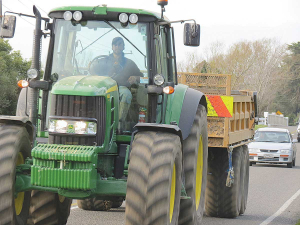Visa changes bring fresh woes
Rural Contractors NZ says members are frustrated at having to work through more layers to get visas approved for skilled seasonal machinery operators ahead of the imminent season start. Andrew Olsen comments.
 NZ rural contractors bring in overseas operators every spring from Europe, UK and the US to supplement local operators in harvesting crops and silage.
NZ rural contractors bring in overseas operators every spring from Europe, UK and the US to supplement local operators in harvesting crops and silage.
A retired Northland farmer and machinery driver says rural contractors must take some blame for the current shortage of skilled operators.
An estimated 28 million tonnes of crop worth $110 million will be at risk if overseas machinery operators are not allowed into the country, according to a survey by Rural Contractors of NZ.
The Bay of Island farmer, who preferred his name not to be used with this article, says contractors should stop moaning and reflect on what they have done to encourage and train local operators.
“These contractors want to pay minimum hourly rates and expect staff to work over a standard 13-hour day as the crop has to be harvested,” he told Rural News.
“I am available but I am not succumbing to slave labour or feeling guilty for asking for a fair and reasonable pay rate.”
Rural Contractors NZ executive director Roger Parton says if contractors charge farmers more, they end up looking for cheaper contractors.
Parton says recruiting and training young people for driving jobs in agriculture hasn’t been easy.
“Working in rural areas doesn’t appeal to young people; there is no broadband, they can’t use their phones and there’s no corner dairy for them to buy their lunch.”
Global trade has been thrown into another bout of uncertainty following the overnight ruling by US Supreme Court, striking down President Donald Trump's decision to impose additional tariffs on trading partners.
Controls on the movement of fruit and vegetables in the Auckland suburb of Mt Roskill have been lifted.
Fonterra farmer shareholders and unit holders are in line for another payment in April.
Farmers are being encouraged to take a closer look at the refrigerants running inside their on-farm systems, as international and domestic pressure continues to build on high global warming potential (GWP) 400-series refrigerants.
As expected, Fonterra has lifted its 2025-26 forecast farmgate milk price mid-point to $9.50/kgMS.
Bovonic says a return on investment study has found its automated mastitis detection technology, QuadSense, is delivering financial, labour, and animal-health benefits on New Zealand dairy farms worth an estimated $29,547 per season.

OPINION: Here w go: the election date is set for November 7 and the politicians are out of the gate…
OPINION: ECan data was released a few days ago showing Canterbury farmers have made “giant strides on environmental performance”.